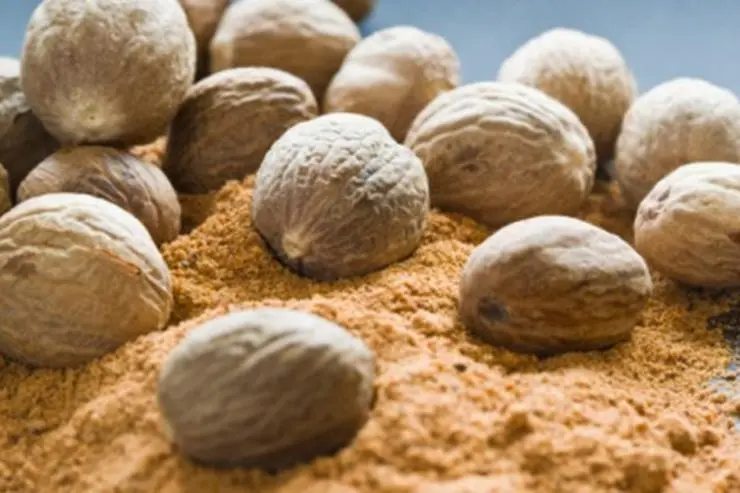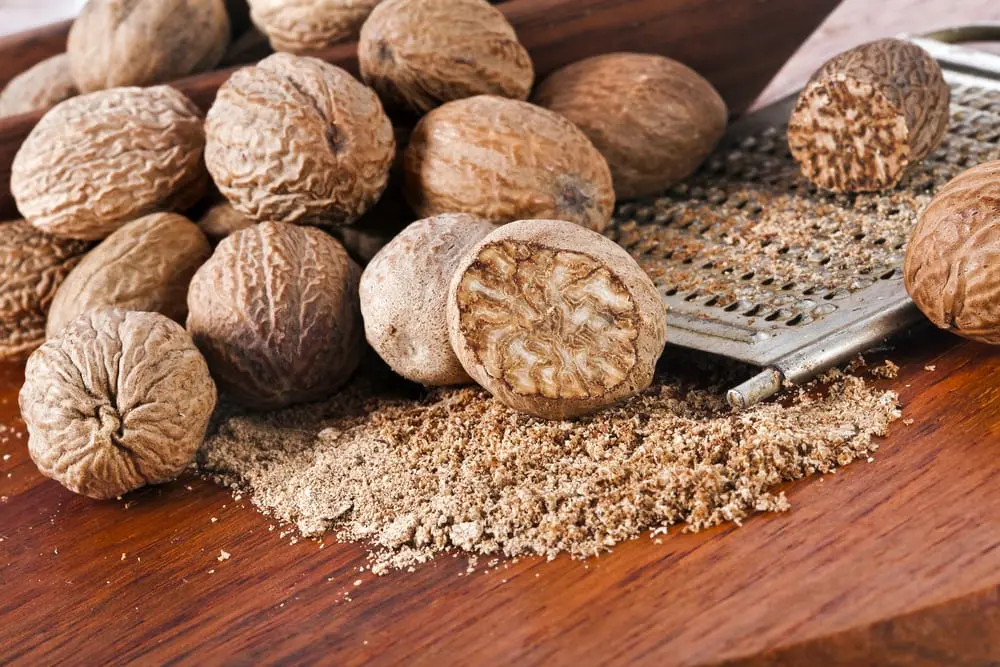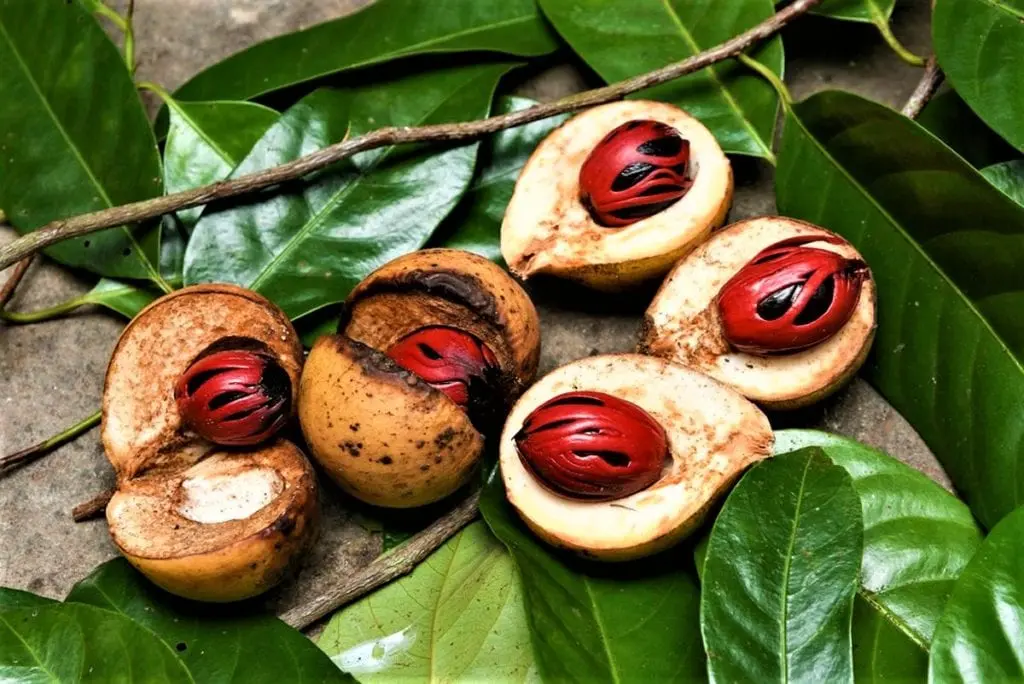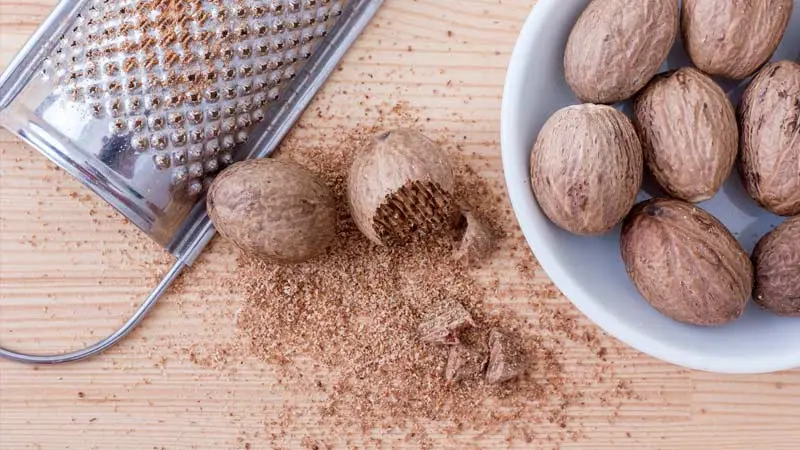Contents
Description
Nutmeg (Myristica fragrans) is a hallucinogen by its action. In Europe, nutmeg is better known as a spice (seasoning), to a lesser extent as a medicine. However, nutmeg is also used to induce intoxication, and consumption of 5-30 grams of nutmeg can be accompanied by hallucinations lasting from 2 to 5 hours.
The narcotic effect is caused by phenylalanine derivatives: myristicin, elemecin and safrole are converted in the body into substances like mescaline and amphetamine.
To achieve narcotic intoxication, nutmeg is eaten, but there are descriptions of nasal inhalation and smoking. There are cases when adolescents advised each other of nutmeg as a natural sedative, however, since they could not choose the dose, instead of the expected euphoria, poisoning with attacks of horror arose.
Historical facts

The monopoly on the supply of nutmeg has always remained the cherished dream of any European monarch, but widespread trade in it began in Europe only after 1512.
How to protect yourself from buying low-quality spices
If there are dark inclusions in ground nutmeg that have a solid structure, then this is definitely not the best quality product. The color should be bright and saturated, and the mixture should have a dull grayish-greenish tint. The mass should taste homogeneous, not crunch on the teeth. The sour taste indicates the addition of the outer shell of the nut.
Nutmeg Composition

Dry nutmeg contains up to 40% fatty oil, consisting mainly of triglycerides of myristic acid and up to 15% – essential oil, with a very complex composition: 13 biologically active components! In addition, nutmeg is rich in vitamins, especially A, C and E, potassium, calcium, sodium, iron, zinc, phosphorus …
But it will not work as a vitamin supplement – the doses will be too small for normal culinary use. But nutmeg oils – both fatty and essential – in this case have a very noticeable effect.
EXPOSURE WITH SHORT-TERM AND LONG-TERM USE
Eating large amounts of nutmeg is accompanied by nausea, vomiting, severe headache, overexcitation and accelerated heart activity.
The onset of intoxication from nutmeg can take several hours, and during this time a person who does not know about it takes an additional dose, because he thinks that the previous one was not enough. The result is the ingestion of a dangerous amount of a substance into the body, the excretion of which the body will take more than one day.
Nutmeg Short Term Use:
- euphoria
- hallucinations
- affective disorders
- fear
- digestive disorders
- redness of the skin
SIDE EFFECTS AND HEALTH RISKS

Side effects and health risks in case of nutmeg:
- depression
- nausea
- vomiting
- convulsions
- dry mouth
- insomnia
- abdominal pain
- irritability
- chest pain
- cold limbs
- dizziness
- delirium
- difficulty breathing
- fear of death
- hyperactivity
- increased body temperature, fever
- rapid pulse
- anxiety
Eating too much nutmeg is usually accompanied by overexcitement, fear and a sense of impending doom. Terrifying psychotic episodes, delusions and hallucinations occur. There have been cases where long-term use of nutmeg has led to chronic psychosis.
In large quantities, nutmeg can cause blood pressure to rise to life-threatening levels that require medical attention. Avoid the simultaneous use of nutmeg with substances such as tryptophan and tyramine (beer, some cheeses, wine, herring, yeast, chicken liver).
DEPENDENCE AND ABSTINENT SYNDROME
Nutmeg does not cause physical dependence. The readily available nutmeg is called the “gateway to drug addiction” because after it many people want to try new substances that cause more intoxication.
SIGNS OF POISONING AND OVERDOSE

An overdose from nutmeg is possible. Starting with a certain amount, the psychoactive effect of nutmeg no longer increases, but its effect and recovery time are prolonged. Abdominal pain, abnormally fast heartbeat, nausea, and dizziness are signs of a nutmeg overdose. Sometimes there is vomiting, problems with breathing and urination.
When poisoning occurs:
- lower blood pressure
- feeling of tightness in the chest
- heart palpitations
Among people who consumed more than 25 grams of nutmeg at a time, almost half required emergency treatment. As the strength of nutmeg varies, overdose amounts may vary from case to case.
Nutmeg Cooking applications
Jams, compotes, puddings and dough sweets are prepared with nutmeg – pretzels, cookies, pies, etc. It is used to flavor vegetables – added to salads and mashed potatoes, rutabagas, turnips, vegetable soups, almost all mushroom dishes, sauces for all types of poultry, pasta, tender meats and fish dishes (boiled and stewed fish , jellied, fish soups).
The most effective use of nutmeg is in dishes that combine meat or fish with vegetables, mushrooms, dough and sauces, many of which nutmeg gives the main flavor.
In world culinary:

Of the Europeans, of course, the Dutch have been and remain the greatest adherents of nutmeg. They add it to dishes of cabbage, potatoes and other vegetables, and season them with meat, soups, and sauces. Indians often include it in spicy mixtures of “garam masala”, Moroccans in “ras el hanut”, and Tunisians in “galat dagga”.
In Indonesia, the woody and sour pulp of the nutmeg fruit is used to make the jam “selei-buah-pala” with a delicate nutmeg aroma. An Italian classic is the combination of spinach and nutmeg in fillings for a wide variety of Italian pasta, and the Swiss sometimes add the nut to their traditional cheese fondue.
Nutmeg Application in medicine
Nutmeg has a very strong stimulating and tonic effect. It also strengthens memory, the nervous system, treats impotence and sexual disorders, heart disease, many benign tumors, such as mastopathy.
It is part of the immune-strengthening fees. In small doses, it is a good sedative, relaxes and induces sleep. Muscat color is a tonic. It is also effective in the treatment of colds.









